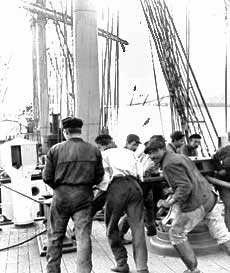Fields: Overcoming discrimination
Mike Blackburn
Working the Waters
Essay: Fields
Women Fishing
Gender relations are a more complicated subject than anyone could hope to understand in a lifetime. In the 20th century women’s rights and roles in society have changed dramatically. A hundred years ago women didn’t even have a right to vote. Now the feminist movement is continuing to break down old ideals of the role women can and can’t play in society. Equality, the idea that there is nothing a man can do that a woman can’t is the goal. Fishing is a great example of women changing the status quo of a traditionally male occupation. Throughout The Entangling Net it was shown that not only can women participate in the fishing industry, they can excel. Still women are not accepted as genuinely part of the fishing industry. The old stereotypes are gradually getting pushed to the wayside as more women prove that they can fish. Despite, sexual harassment, pregnancies, jealous wives, and a smaller stature the women in these accounts seemed to persevere through trials that no male fisherman had to endure.
It is interesting the opposition that women face in the fishing industry from other women. The wives of skippers seemed to be very unsupportive of there husbands being on a boat with another woman. They were afraid that the women were trying to steal their husbands or perhaps they felt undermined because they were the ones staying at home while other women were out at sea. Having women on boats upset their ideas about what role women could play in the fishing world. A lot of women seemed to get started fishing because their husbands or boyfriends fished or because they were raised in a commercial fishing family.
Even before they had the job, harassment was expected by the women fishermen. Virginia Adams recounts, “I pounded the docks and got the typical- I could go for half share and be really sweet with the captain,” (p54, 55). She had seven years of commercial fishing experience but that didn’t matter. She was a woman and was subject to discrimination because of it. The sexual harassment on the boat never seemed dangerous from the stories that were told. Laurie Knapp told of skippers saying, “Gee, would you like to go to bed with me.” But she also states that she “was never close to being raped.” That is a positive thing, but what kind of environment do these women work in where every kind of harassment short of rape is endurable?
Several of the women in The Entangling Net recounted stories of having to start as a cook. Even with experience as a deckhand Christine Holmes was hired on a catcher-processor as an assistant cook. She had to prove herself against deliberate discrimination by working on deck in her spare time. This quote sums up the captains attitude about having her on deck: “Oh that little gal from Cordova has a lot to learn. She’s going to find out it’s a heck of a lot different up here in the Bering Sea than it is working on some little gill net in a nice warm warehouse in Cordova,” (p64).
Fishing is hard manual labor. The gear involved is heavy to work with. It is difficult for a five foot, hundred pound woman to be able to do the same labor a 6ix foot, and two hundred pound man would. The most logical reason (to me at least) for a man to tell a woman they can’t fish is because women are not strong enough. That didn’t stop anyone in this book though. Holly Berry spoke of stacking 700-pound crab pots on a deck in heavy seas. She talked about the rhythm of it. Technique and finesse was used to do similar work that the men did.
When it comes down to it, it is harder for women to participate in the fishing industry. Not only are women physically less disposed to the labor of it, but also the men in the business make it even more difficult with their harassment. The wives of the fishermen in the community are equally unsupportive of women fishing. However, the ladies in this book are proving that women can succeed in fishing. They are paving a trail for other women to follow in their footsteps. Fishing is a dangerous occupation and the work is laborious and the hours horrific. You must really love what you are doing, or are getting paid really well to do it, to be a female fishing in Alaska.

